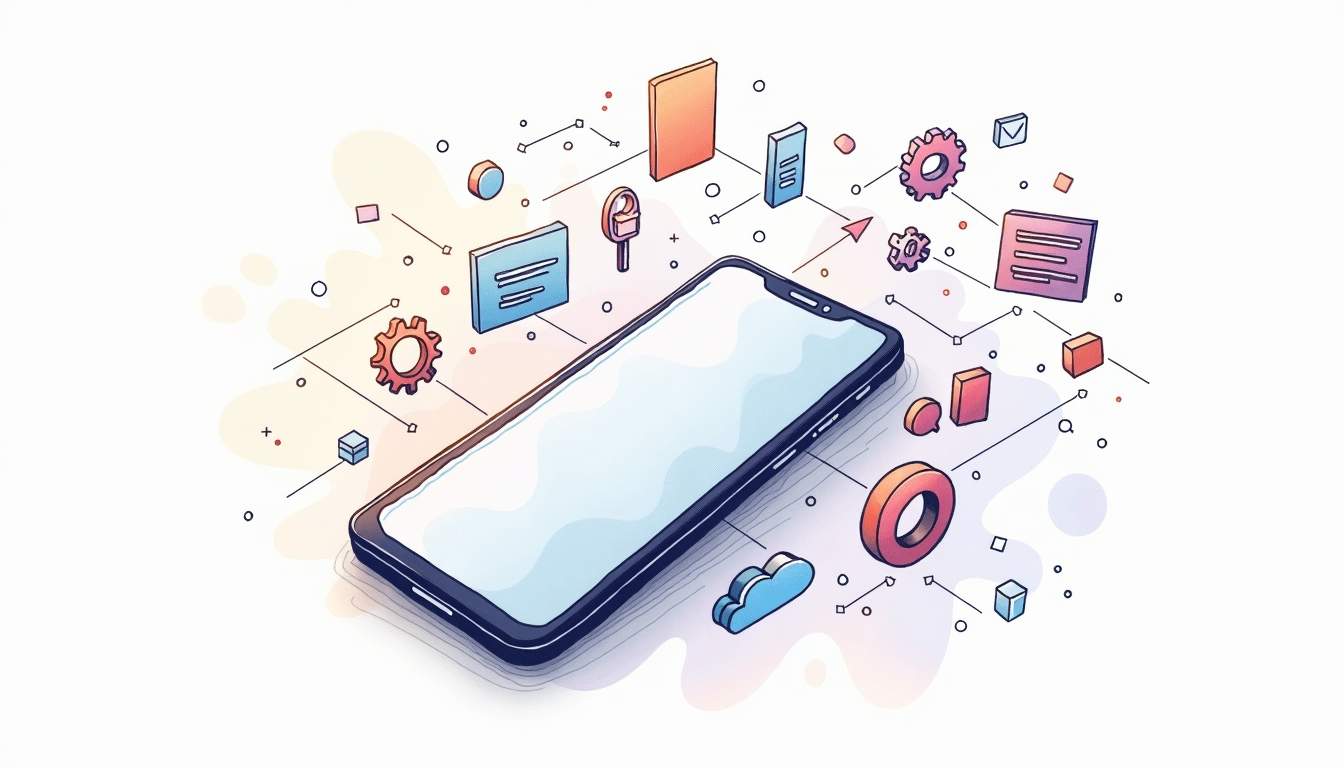In 2025, knowing how to hire Android app developers is more than a technical decision. It’s a strategic one. With Android powering more than 70% of smartphones globally, your Android app often becomes the first touchpoint between your startup and your customers.
For founders and product managers focused on building MVPs or achieving product–market fit, the right Android team determines how quickly you can validate ideas, reduce risk, and scale. At Wednesday Solutions, this hiring decision is seen not simply as recruitment, but as a critical step in shaping a product’s trajectory from idea to impact.
This guide explores every dimension of hiring Android app developers in 2025, from understanding what they do and how to evaluate their skills to choosing the right engagement model and maximizing your development ROI.
What Android App Developers Actually Do
Android developers are software engineers who specialize in creating applications for devices running the Android operating system. They design, code, test, and maintain mobile experiences that combine functionality with usability.
Technically, Android developers work primarily with Kotlin (the modern standard) and Java, using Android Studio as their integrated development environment. They integrate APIs, manage app lifecycles, build UIs with Jetpack Compose, and implement Material Design principles for consistency and polish.
Their role, however, extends well beyond coding. Skilled developers interpret business requirements, collaborate with designers and product managers, and translate concepts into reliable, high-performing apps. They ensure that apps run smoothly across hundreds of device types, screen sizes, and OS versions, while maintaining security and efficiency.
Strong Android engineers also stay aligned with Google’s evolving ecosystem—adapting to new SDKs, design frameworks, and security updates as they emerge.
The best developers think like product builders. They understand how their decisions influence customer experience, retention, and even revenue.
Why Android Developers Matter for Startups
For startups, Android developers can accelerate learning, improve iteration speed, and unlock global reach. Their work impacts both technical and commercial outcomes.
1. Access to a Global User Base
Android dominates emerging markets across Asia, Africa, and Latin America. If your MVP aims to test or scale globally, Android gives you the largest, most diverse potential user base.
2. Faster Time-to-Market
Experienced Android engineers have seen common pitfalls before. They know which tools and libraries accelerate development without compromising quality, helping startups release and iterate faster.
3. Scalability from Day One
Well-architected code prevents rework later. Senior Android developers structure applications to grow with your roadmap—critical for products expected to evolve quickly.
4. User Experience that Drives Retention
Performance, responsiveness, and seamless interaction determine whether users stay or churn. The right developer ensures your app feels intuitive and native across devices.
5. Insight through Analytics and Data
Developers integrate data frameworks and analytics tools that help product teams understand user behavior and make evidence-based decisions.
The Different Types of Android Developers
Understanding developer levels helps you build the right team for your stage and goals.
Junior Developers (1–3 years)
Good for well-defined, specific tasks under supervision. Cost-effective but limited in architectural judgment.
Mid-Level Developers (3–6 years)
Operate independently on most features. Balance cost and capability well for MVPs or early PMF phases.
Senior Developers (6+ years)
Own system design, scalability, and architecture. Ideal for complex builds, integrations, or long-term products.
Specialized Developers
Experts in domains such as fintech, healthcare, or gaming. Their domain understanding helps navigate compliance, integrations, and user expectations.
Full-Stack Mobile Developers
Skilled in both Android and iOS, often via Flutter or React Native. Useful for MVPs needing fast cross-platform validation but may involve trade-offs in platform-specific optimization.

Where to Find Android App Developers
Finding developers is easy; finding the right ones is strategic.
1. Freelance Platforms
Websites like Upwork, Toptal, and Freelancer host vast global pools of Android developers. Suitable for prototypes or small projects where flexibility matters.
Pros: Fast onboarding, wide availability.
Cons: Quality varies; requires close project management.
2. Development Agencies
Partnering with an experienced development firm gives you access to an established team of developers, designers, and product leads. Agencies handle project management and quality assurance, freeing you to focus on strategy.
Wednesday Solutions often engages this way—acting as an external product team that handles discovery, design, and engineering under a unified framework.
3. In-House Hiring
For companies with ongoing development needs, building an internal Android team ensures deep alignment with the product vision.
Pros: Long-term ownership, integrated culture.
Cons: High recruitment and operational costs.
4. Technical Recruiting Firms
Recruiters accelerate candidate sourcing and provide pre-vetted options. Best for companies that want speed and have internal capability to evaluate technical quality.
5. Developer Communities
Platforms like GitHub, Stack Overflow, and Reddit showcase developers through their open-source work. Engaging here can uncover passionate contributors whose quality is visible through code, not just resumes.
6. Offshore Development Partners
Modern offshore teams can provide exceptional value when well-managed. Leading firms in Eastern Europe, Southeast Asia, and Latin America offer strong technical capability with significant cost advantages.
The key is structured communication and accountability—areas where Wednesday Solutions has refined its process to deliver enterprise-quality results with global collaboration models.
Essential Skills and Qualifications to Look For
The best Android developers combine technical precision with strategic thinking.
Core Technical Skills
- Proficiency in Kotlin (and Java for legacy support)
- Deep knowledge of Android SDKs, Jetpack components, and Compose UI
- Experience with MVVM, MVP, or Clean Architecture
- Familiarity with Room, Retrofit, and Coroutines
- Strong understanding of testing frameworks (JUnit, Espresso, Mockito)
- Ability to set up CI/CD pipelines and manage Play Store deployment
- Awareness of security principles and performance optimization
Soft Skills That Predict Success
- Strong communication and collaboration
- Problem-solving under constraints
- Ownership of outcomes, not just tasks
- Curiosity and adaptability
At Wednesday Solutions, developers are evaluated not only on their technical expertise but on their ability to align with product intent—translating user needs into scalable, maintainable systems that drive measurable business results.
Structuring an Effective Hiring Process
A clear, structured process makes hiring efficient and fair while helping you identify real talent.
1. Define the Scope and Goals
Outline what you need: MVP validation, scaling, or feature rebuild. Knowing your objectives clarifies required experience levels.
2. Craft Specific Job Descriptions
Generic listings attract generic talent. Be transparent about your stack, challenges, and expectations.
3. Start with Screening for Fit
Initial conversations should test communication style, motivation, and cultural alignment before moving to technical depth.
4. Assess Technical Competence
Use take-home projects or code reviews that reflect real work. Avoid abstract algorithm tests that don’t mirror actual Android development.
5. Collaborative Interviews
Conduct a joint problem-solving session to observe how candidates reason and communicate.
6. Validate Through References and Portfolios
Review apps on the Play Store, GitHub contributions, and past collaborators’ feedback to verify impact and delivery quality.

Common Hiring Mistakes
Even experienced teams repeat predictable errors:
- Prioritizing cost over competence. Cheap code often leads to expensive rework.
- Skipping communication assessments. Remote work magnifies misalignment.
- Rushing the process due to urgency. A wrong hire delays progress more than a slow search.
- Ignoring cultural or mission alignment. Technical skills can’t offset poor collaboration.
- Failing to onboard effectively. Developers need context, documentation, and product vision to perform.
Understanding Android Developer Costs in 2025
Costs vary widely based on experience, geography, and engagement model.
In North America, mid-level Android developers typically earn between $90,000 and $130,000 per year, while senior engineers can reach $180,000 or more.
In Western Europe, salaries range from €60,000 to €90,000 for mid-level and up to €120,000 for senior developers.
Eastern Europe offers strong quality at 30–50% lower rates, generally between $40,000 and $100,000 annually.
In Asia, particularly India, Vietnam, and the Philippines, costs range from $25,000 to $70,000 depending on experience and project type.
Latin America typically falls between $40,000 for mid-level and $110,000 for senior developers, often with favorable time zone overlap for U.S. companies.
Project-based pricing depends on complexity:
- MVPs may require 400–600 development hours.
- Mid-complexity apps range from 800–1,200 hours.
- Enterprise-grade or deeply integrated apps exceed 1,500 hours.
Wednesday Solutions approaches cost differently. Its outcome-driven pricing model means clients pay for results—validated milestones and tangible deliverables—not hourly effort. This alignment ensures every sprint drives measurable business outcomes rather than billable hours.
Maximizing ROI on Android Development
To get the most from your investment, combine technical execution with strategic planning.
- Start Small, Learn Fast
Build an MVP to validate your concept before scaling. Each iteration should refine both product and market understanding. - Invest in Architecture Early
Clean, modular architecture saves months later when features expand or integrations grow. - Prioritize Code Quality and Testing
Automation and continuous integration reduce bugs, lower maintenance costs, and speed up releases. - Embed Analytics from Day One
Measure how users interact with your product. Data replaces assumption in achieving PMF. - Iterate through Feedback Loops
Agile release cycles allow faster adaptation and more precise prioritization. - Plan for Maintenance
Updating for new Android versions, security patches, and UX improvements is part of sustaining success.
De-Risking Android Development
Building software always carries uncertainty—scope shifts, technology challenges, and market changes. The solution is structure.
Wednesday Solutions addresses this through its Sprint Zero program, a four-week discovery and planning phase designed to remove guesswork before full development begins.
Sprint Zero includes:
- Product discovery and requirement definition
- User flow mapping and rapid prototyping
- Technical architecture and scalability planning
- Roadmap creation and delivery forecasting
By completing Sprint Zero, startups gain clarity on scope, cost, and timeline—turning ambiguity into actionable strategy. It’s a system proven to prevent scope creep and costly rework later.
Why Wednesday Solutions Is a Trusted Partner for Android App Development
Wednesday Solutions is more than a development vendor; it is a strategic product partner for companies aiming to build Android apps that matter. With deep expertise across startups and enterprises, the firm combines design, engineering, and delivery discipline into one cohesive model in its Product Launch Program.
Key Differentiators
1. Sprint Zero: Clarity Before Code
A structured discovery framework that defines goals, validates assumptions, and lays the foundation for successful execution.
2. Outcome-Driven Pricing
Clients pay for results, not hours. Wednesday Solutions aligns incentives with delivery, ensuring accountability and measurable progress.
3. Senior-First Engineering Talent
Every project is led by senior developers and architects who bring both technical mastery and product judgment.
4. Global-Grade Delivery Model
Wednesday’s distributed teams deliver with enterprise-level rigor—process transparency, automated QA, and predictable delivery cycles.
5. Product Partnership Approach
Wednesday collaborates as a true partner, not a vendor. Teams work alongside founders and product managers to achieve business outcomes, not just technical outputs.
Over the past several years, Wednesday Solutions has helped startups across fintech, healthcare, logistics, and consumer technology go from MVP to scale, delivering Android apps used by millions worldwide. Its structured process, experienced teams, and outcome-based model have positioned it as one of the most reliable and forward-thinking Android development partners globally.
The Bottom Line
Hiring Android app developers in 2025 is about far more than filling technical roles. It’s about assembling a product capability—people who can translate vision into scalable, reliable, and user-centered experiences.
The right developer or partner doesn’t just deliver code. They deliver learning speed, customer satisfaction, and long-term resilience.
For startups and product leaders navigating this process, choosing experienced, outcome-oriented partners like Wednesday Solutions can mean the difference between building an app and building a business.






